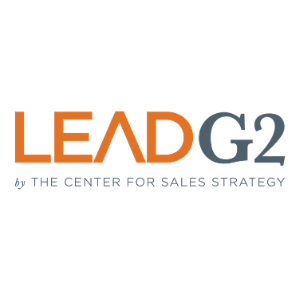10 Signs That It’s Time to Adopt an Inbound Marketing Strategy
“Now is just not a good time.” Salespeople of every stripe dread hearing those words. And yet, if your sellers are encountering that sentiment...
7 min read
 LeadG2
:
September 21, 2023
LeadG2
:
September 21, 2023


Are you feeling frustrated and disappointed with the results of your inbound marketing efforts in your first year?
Many businesses struggle to see the desired outcomes from their inbound marketing strategies right out of the gate. But fear not, because, in this article, we're going to reveal the secrets to unlocking a successful inbound marketing strategy and overcoming that initial disappointment.
From understanding your target audience and creating valuable content to optimizing your website and leveraging social media, we'll discuss the key elements that will propel your inbound marketing efforts to new heights.
Setting realistic goals
Identifying the right target persona
Measuring the success of your inbound strategy
Implementing an inbound marketing strategy can be challenging, especially in the first year. One of the biggest challenges is setting realistic expectations. Many businesses expect immediate results and become discouraged when they don't see a significant increase in leads or conversions right away. It's important to understand that inbound marketing is a long-term strategy that requires patience and consistent effort.
Another challenge is identifying the right target persona. Without a clear understanding of who your ideal customers are, it's difficult to create content that resonates with them. Take the time to research and define your target persona's demographics, interests, pain points, and preferences. This will help you tailor your inbound marketing efforts to attract the right people.
Additionally, measuring the success of your inbound marketing strategy can be challenging. It's important to track key metrics such as website traffic, conversion rates, and engagement levels to determine whether your efforts are paying off. However, it can be overwhelming to analyze all the data and make sense of it. Utilizing analytics tools and seeking professional guidance can help you make data-driven decisions.
Setting realistic expectations is crucial for the success of your inbound marketing strategy. While it's natural to be excited and hopeful about the potential results, it's important to understand that building an online presence and generating leads takes time. Rome wasn't built in a day, and the same goes for an effective inbound marketing strategy.
However, you can expect to see some immediate results by taking the right actions upfront. We recommend launching a campaign right away to start driving new and more leads. You can immediately optimize and add forms to capture leads from your website traffic. You can also see immediate results by marketing strategically to your existing database in various ways. The key is being clear about your goals and what specific actions you'll take right away to drive immediate results, while also focusing on longer-term relationship building and establishing your business as a thought leader over time.
Instead of only expecting long-term results, focus on celebrating small victories like increasing website traffic or positive comments on blog posts. Every step forward is progress. Don't let the lack of immediate overhaul discourage you. Keep pushing forward and stay committed to your inbound marketing strategy for the long haul.
In the first year of implementing an inbound marketing strategy, there are several common pitfalls that businesses often fall into. One of the most common mistakes is failing to create valuable content. Content is the foundation of inbound marketing. It's what attracts and engages your target audience. If your content is not valuable or relevant to your audience, they won't stick around.
To avoid this pitfall, take the time to understand your target persona's pain points and challenges. Create content that addresses these issues and provides solutions. Focus on quality over quantity and make sure your content is informative, engaging, and shareable. This will help you establish credibility and build trust with your audience.
Another common pitfall is neglecting website optimization. Your website is the hub of your inbound marketing strategy. If it's slow, difficult to navigate, or not mobile-friendly, you're likely to lose visitors and potential leads. Optimize your website for speed, user experience, and search engine optimization (SEO). Make sure your website is easy to navigate, visually appealing, and provides a seamless user experience across different devices.
Experiencing disappointment in your first year of inbound marketing is normal, but it's important not to let it discourage you. Instead, use it as an opportunity to learn and grow. Analyze what worked and what didn't, and make adjustments accordingly. Remember that success is not guaranteed overnight, but with perseverance and continuous improvement, you can achieve your goals.
One way to stay motivated is to celebrate small wins along the way. Recognize and appreciate the progress you've made, no matter how small. This will help you stay focused and motivated, even when the results are not immediately apparent.
Another key to staying motivated is to surround yourself with a supportive community. Join online forums, networking groups, or industry events where you can connect with like-minded individuals who are also on their inbound marketing journey. Share your challenges and successes, and learn from others who have overcome similar obstacles. Having a supportive community can provide encouragement, inspiration, and valuable insights.
Analyzing and adjusting your inbound marketing strategy is essential for achieving success. Regularly review your website analytics to gain insights into your audience's behavior and preferences. Identify which marketing channels are driving the most traffic and conversions, and allocate your resources accordingly.
In addition to website analytics, monitor your social media engagement, email marketing performance, and content reach. Identify trends, patterns, and areas for improvement. Use this data to inform your decision-making and make data-driven adjustments to your inbound marketing strategy.
It's also important to stay up-to-date with the latest industry trends and best practices. Inbound marketing is constantly evolving, and what worked yesterday may not work today. Continuously educate yourself and be open to experimenting with new tactics and strategies. Stay agile and adaptable to ensure your inbound marketing efforts stay relevant and effective.
Data-driven insights are the backbone of a successful inbound marketing strategy. By analyzing and understanding your audience's behavior, preferences, and needs, you can tailor your marketing efforts to meet their expectations. Use website analytics tools to track key metrics such as traffic sources, conversion rates, and bounce rates.
Identify which marketing channels are driving the most qualified leads and focus your resources on those channels. Use A/B testing to experiment with different strategies and track the impact on your conversion rates. Leverage customer feedback and surveys to gain qualitative insights into your audience's experience and satisfaction.
By utilizing data-driven insights, you can make informed decisions and optimize your inbound marketing strategy for maximum impact. Remember, the more you know about your audience, the better you can serve them and meet their needs.
Inbound marketing encompasses a wide range of tactics and strategies. To maximize your success, it's important to incorporate various inbound marketing tactics into your strategy. Here are some key tactics to consider:
Content Marketing: Create valuable and informative content that addresses your audience's pain points and provides solutions. Publish blog posts, ebooks, whitepapers, and videos that establish your business as a trusted source of information.
Search Engine Optimization (SEO): Optimize your website and content for search engines to improve your organic visibility. Conduct keyword research, optimize your meta tags, and build high-quality backlinks to increase your search engine rankings.
Social Media Marketing: Leverage social media platforms to engage with your audience, share valuable content, and build brand awareness. Identify the social media platforms your target audience frequents and create a consistent posting schedule.
Email Marketing: Build and nurture your email list to establish direct communication with your audience. Send personalized, relevant, and valuable emails to keep your audience engaged and informed.
Video Marketing: Incorporate video content into your inbound marketing strategy to increase engagement and reach a wider audience. Create educational videos, product demos, or customer testimonials to showcase the value your business offers.
By incorporating these different tactics into your inbound marketing strategy, you can reach your audience through various channels and increase your chances of success.
Inbound marketing is not just about attracting new leads; it's also about building and nurturing relationships with your existing customers. By providing ongoing value and support, you can turn one-time buyers into loyal brand advocates.
One way to build and nurture customer relationships is through personalized communication. Use email marketing to send targeted messages and offers based on your customer's preferences and past interactions. Segment your email list based on demographics, purchasing behavior, or engagement levels to ensure your messages are relevant and timely.
Another effective strategy is to provide exceptional customer service. Be responsive to customer inquiries and concerns, and go above and beyond to exceed their expectations. Engage with your audience on social media by responding to comments, messages, and reviews. By demonstrating that you genuinely care about your customers, you'll build trust and loyalty.
Additionally, encourage customer feedback and reviews. Positive reviews and testimonials can help attract new customers, while constructive feedback can help you improve your products or services. Make it easy for customers to leave reviews on your website, social media platforms, or third-party review sites.
Measuring the success of your inbound marketing efforts is crucial for determining the effectiveness of your strategy and making data-driven decisions. Here are some key metrics to track:
Website Traffic: Monitor the number of visitors to your website to gauge the effectiveness of your inbound marketing efforts. Track the sources of traffic, such as organic search, social media, or referrals, to identify which channels are driving the most visitors.
Conversion Rates: Measure the percentage of visitors who take a desired action, such as filling out a form, making a purchase, or subscribing to your newsletter. Calculate your conversion rates to determine how effective your calls-to-action and landing pages are.
Engagement Levels: Analyze metrics such as time on page, bounce rate, and social media engagement to assess how engaged your audience is with your content. High engagement levels indicate that your content is resonating with your audience.
Lead Generation: Evaluate the number and quality of leads generated through your inbound marketing efforts. Track the conversion rates of your lead capture forms and assess the lead-to-customer conversion rate to determine the effectiveness of your lead nurturing efforts.
New Business Revenue: Most importantly, track the revenue generated from new business acquired through your inbound marketing efforts. Analyze the sales pipeline and tie leads directly to closed sales to clearly demonstrate the ROI of your inbound strategy.
By regularly tracking these metrics, you can identify areas for improvement and make data-driven adjustments to your inbound marketing strategy.
Implementing an effective inbound marketing strategy can be overwhelming, especially for businesses in their first year. If you're feeling stuck or unsure about how to proceed, don't hesitate to seek professional support and guidance.
Consider hiring an inbound marketing agency that specializes in helping businesses achieve their online marketing goals. They can provide valuable insights, guidance, and expertise to help you navigate the challenges of inbound marketing. They can also help you develop a customized strategy tailored to your business's unique needs and goals.
Additionally, attending industry conferences, webinars, and workshops can provide you with the opportunity to learn from experts in the field and connect with other business owners who are on their own inbound marketing journey. Networking and learning from others can provide inspiration, support, and valuable insights.
Remember, you don't have to go it alone. Seeking professional support and guidance can help you overcome challenges, stay motivated, and achieve your inbound marketing goals.
While the first year of implementing an inbound marketing strategy may not have yielded the results you were hoping for, don't get discouraged.
Building an effective inbound marketing approach takes time, testing, and perseverance. Stay committed to providing value to your potential customers through content creation, SEO optimization, and social media engagement. Measure your efforts, learn from your mistakes, and continue refining your strategy.
With a willingness to experiment and adapt, you will start to see increased website traffic, leads, and sales over time. Even if progress feels slow at first, inbound marketing works for building trust and establishing your company as an authority in your industry. As long as you keep your audience's needs front and center, you will find success in converting visitors into delighted customers. Stay positive, be patient, and keep moving forward. The payoff of a robust inbound marketing program is worth the effort required in those important early stages.
*Editor's Note: This blog title was originally published in 2014 and has since been updated.

“Now is just not a good time.” Salespeople of every stripe dread hearing those words. And yet, if your sellers are encountering that sentiment...

“Leads are the metric that, as marketers, we rely on. Because leads mean money.” This is a quote from Kip Bodnar of HubSpot. HubSpot knows lead...

55 Brands who prioritize blogging efforts are 13x more likely to see positive ROI, and 55% of brands say blog content creation is their top inbound...